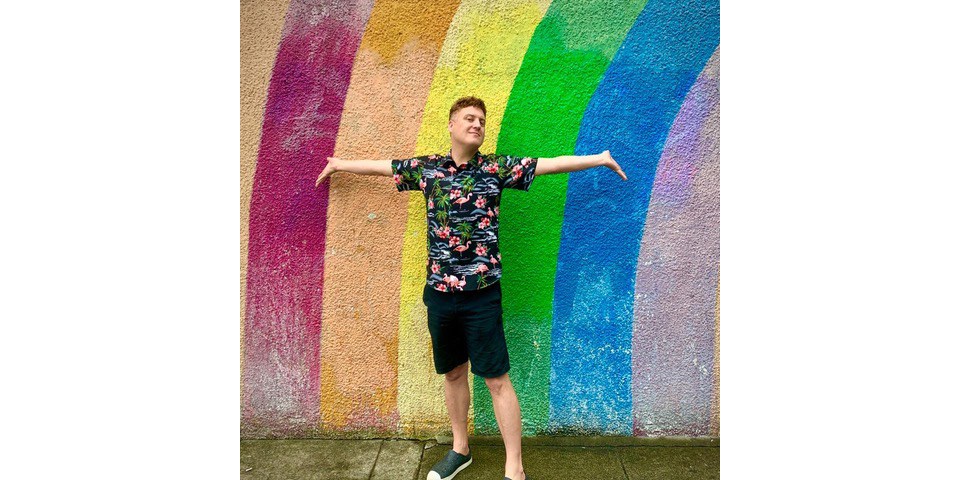For some, high school is a sanctuary.
For others, it can be a fight for freedom of expression — the latter being true for one young Richmondite.
Jordyn Butler, now 22, is a hairstylist, fashion fanatic and avid skateboarder — they are also non-binary.
“I identify as non-binary, as well as being totally happy with my femininity,” said the 2017 Hugh Boyd grad.
“I’ve always gone between being super feminine and being a tomboy — yet not feeling like I fit in anywhere.”
When asked about acceptance within their family, Butler said it has been a journey.
“My family has been pretty supportive, and I know I am more than lucky for that,” said Butler.
“But it was hard in the beginning because I came out very early — in Grade 9.”
When Butler first came out to their family, they were told it was “just a phase.”
At school, Butler struggled to seek approval, despite support from friends.
“[In high school] I was locked in my locker, had footballs thrown at my head and trash cans kicked at me,” said Butler. “I was told to go back to my gender.”
When they tried to go to a member of faculty to talk about the bullying, they were met with silence.
“There were a couple times when I tried to bring up harassment, even with a teacher, and nothing,” said Butler.
Outside of the hallways of high school, things haven’t been much easier.
Recently, Butler found themself being referred to as an “it” while taking the bus through Richmond — something they said made them “feel gross in my own skin.”
Butler believes more supports for LGBTQ+ youth could help.
“There isn’t a lot of representation in Richmond. Even the rainbow road across from the library, no one in the LGBTQ+ community voted for that,” said Butler. “That’s not where we would want the money to go to. It should be going toward things that actually better the lives of LGBTQ+ people.”
Butler explained that most of the community that they have connected with has been through Vancouver-based initiatives.
“If I didn’t go to my first Pride [parade] in Vancouver, I think I would be a very different person,” said Butler.
In 2018, the Richmond School District implemented Policy 106: Sexual Orientation and Gender Identity (SOGI).
The policy intends to protect and provide support for LGBTQ+ youth through elementary and high school.
Bryan Bone is an art and learning resource teacher at MacNeill Secondary, as well as a SOGI representative both within the school and district wide.
“Myself, colleagues and students who have had to deal with harassment and bullying are feeling significantly more heard, valued and respected than ever before,” said Bone, referring to the SOGI policy.
Bone said that allowing for schools and classrooms to serve as safe spaces is what allows for students to be themselves.
“We have rainbow and trans flags hanging proudly in our lounge side-by-side with countries who are extremely anti-LGBTQ+, and a lot of these kids come from cultures that are also very anti-LGBTQ+,” said Bone.
Although these images are helpful for boosting LGBTQ+ visibility, Bone said there is still a lot of work to be done within the curriculum itself.
“This is still the area where teachers are choosing not to include so many of them (LGBTQ+ positive images),” said Bone.
“Things that are very simple, like including a same-sex couple in a math word problem. That visibility is so critically important.”
He acknowledges that the positive representation and support systems available for LGBTQ+ youth at MacNeill isn’t the norm for every school — something he hopes to see change in years to come.
Outside of the classroom, Bone performs under the drag persona Miss Gina Tonic, taking part in events like Drag Queen Storytime at public libraries. “It lends itself to being an educator and discussions around gender identity and gender expression,” said Bone. “It’s a big part of the way I’ve been able to work through those topics with people of all ages.”
While there have been vast improvements for LGBTQ+ students and staff at some schools, he understands harassment and bullying still exists for so many.
“The way that I explain it to my students is that change like this is an elastic band. Once it stretches, you are bound to get some snap back,” said Bone. “We still see the occasional [LGBTQ+] poster defaced or teachers making it known that these aren’t things that are welcome (in class).”
Although Butler graduated before the SOGI policy was introduced, they said steps forward like this are necessary for the well-being of youth in the community.
Butler said that above all, they just want to be able to express themselves in the community and be accepted for who they are.
“We make such a big deal about what’s in our pants, but that’s not what makes you a person,” said Butler. “Probably the most important thing about us is our brains and our hearts. But we aren’t considered for that, we’re considered for our gender.”
Going forward, Butler hopes to use their education in cosmetology and hairdressing to open their own unisex hair salon, allowing anyone to go and “feel beautiful.”
“I express myself the way that I do because I want people to see that you can unapologetically be yourself, regardless of what some people may think of you,” said Butler.



